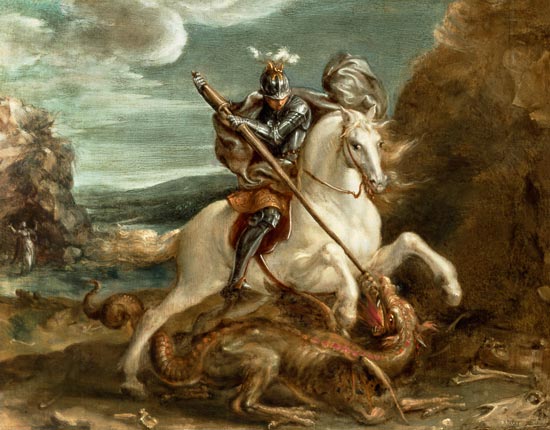 Hans von Aachen. St George slaying the Dragon.
Hans von Aachen. St George slaying the Dragon.The Feast of St George
 St George for Merrie England!
St George for Merrie England!Today is the Feast of
St George, Protector of the English Realm.
He is not the Patron Saint of England - that is
St Edmund, King and Martyr.
Today is the feast which was transferred from
Holy Saturday and cannot co-incide with the
Easter Octave or the Feast of
St Joseph the Workman (yesterday).
St George was born to a Christian family during the late third century. His father was from Cappadocia and served as an officer of the Roman army. His mother was from Lydda in Palestine.
St George followed his father into the army. It seems he was of
equestrian, or knightly and thus noble, rank in Roman society and he appears to have pursued the
cursus honorum beginning as a cavalryman or knight, a position reserved only for those of the knightly class. The better quality commanders among the cavalry or knights went on to command as
Decurion and later were selected as
Tribunus militis or Military Tribune, an officer who was one of 5 staff officers in a Legion.
The
Roman Senate was selected from the ranks of the knights or equestrian class, and the
Patrician and
Senatorial classes, the supreme nobility of Rome, who were able to trace their lineage to the Senatorial families of the early days of Rome, especially those who had seen extensive military service in defence of Rome and its empire.
 The Roman Senate
The Roman Senate was stationed in Nicomedia as a member of the personal guard attached to Roman Emperor Diocletian and was promoted
comes or
Count, a title, meaning a “companion”, or sometimes a chamberlain, of the Emperor, an imperial appointment either civil or military (from this idea derived the
Counts-Palatine or
Paladins of the
Holy Roman Emperor, Charlemagne).
Many titles of nobility have a military origin including those of
imperator (later Emperor but originally meaning the commander-in-chief of the army,
lit., “giver of orders”),
dux (later Duke or army commander),
legatus (
Legate – the commander of a legion, and of senatorial rank),
tribunus (staff officer of equestrian class already mentioned),
praefectus castrorum (Prefect of the Camp, the most veteran soldier in the Legion but non-equestrian),
primus pilus (“first spear”, the most senior centurion and commander of the first cohort, non-equestrian but usually ennobled on retirement),
pilus prior (first centurion of each cohort and often its commander),
primi ordines (the 5 centurions of the first cohort),
centurio (centurion – the commander of a “century” of 100 men) and
optio (the second-in-command of a century but able to read and write, usually).
 Gaius Julius Caesar,
Gaius Julius Caesar,
Roman general, patrician, equestrian, senator and imperator Each
legion had
10 cohorts usually each of
6 centuries (sometimes divided into
3 maniples of
2 centuries each), plus 300 or more
cavalry and assorted
light infantry,
light cavalry and
auxiliaries (often of non-Roman origin) totalling about 6,600 men.
A
Military Legate is thus roughly equivalent to a brigadier-general, a
Military Tribune to an equestrian major or lieutenant-colonel, a
pilus prior to a non-equestrian lieutenant colonel, risen from the ranks, and a
centurion to a non-equestrian captain or major, risen from the ranks.
 Dante Gabriel Rosetti. The Wedding of St George. 1857.
Dante Gabriel Rosetti. The Wedding of St George. 1857.In 303 AD
Emperor Diocletian issued an edict authorizing the systematic persecution of Christians across the Empire.
St George was ordered to participate in the persecution but instead confessed to being a Christian himself and criticized the imperial decision. An enraged Diocletian ordered his torture and execution.
After various tortures, including laceration on a wheel of swords, in which he was miraculously resuscitated three times, St George was executed by decapitation before Nicomedia's city wall, on 23 April 303.
A witness of his suffering convinced
Empress Alexandra to become Christian as well and she joined St George in martyrdom.
St George’s body was returned to Lydda for burial, where Christians soon came to honour him as a martyr.
The story of St George and the Dragon is by no means necessarily impossible, since reptiles of various sorts were often called dragons in former times.
Even today, the Komodo dragon is still so called.

Dragons of today:
Indonesian Komodo dragons, up to 10 feet in length and up to 365 lbs weight, poison-mouthed and potentially lethal, can be seen to this day
Ancient depictions of
“fire-breathing” dragons have been misinterpreted.
They were so depicted to indicate the poisonous breath and mouth of such animals. Since it is the case that the
Komodo dragon has precisely such a poisonous mouth, by virtue of the bacteria living therein, its venom and its diet, the earlier depictions start to look remarkably scientific and not mythical at all.
The deadliest bacteria in the Komodo dragon saliva appears to be a very deadly strain of
Pasteurella multocida, from studies performed with lab mice.
Alternatively, the dragon might have been a crocodile or alligator which certainly can be found in North Africa near water.
This dragon was said to have made its nest at the spring providing water for a city in the Middle East. The citizens had to dislodge the dragon from its nest for a time, in order to collect water. To do so, and to distract the dragon, each day they had to offer the dragon at first a sheep, then a human, to distract it and the humans were often attacked and killed.
In their heathenism, the people treated the dragon as an evil spirit that had to be placated. The victim was chosen by drawing lots. One ill-favoured day, the lot fell upon the daughter of the king who begged for her life but this partiality was rejected by the citizenry.
St George, who was in the country with his troops, scorning both heathenism and the dragon, set out, warmly encouraged of course by the king, to rescue the princess. He did so, slaying the dragon in mortal combat. The grateful citizens abandoned heathenism and converted enthusiastically to the religion of
St George, namely Christianity.
Ever after, the story was seen as the triumph of Christian truth over pagan superstition and the supernatural over corrupted nature. Inevitably, it became a great Christian allegory. However, the assumption that it must, therefore, be a fable and not true, is a false assumption. The Bible is full of allegory but that does not mean it is false.
A church built in
Lydda during the reign of the
Emperor Constantine I (306–337), was consecrated to
St George and his
cultus became one of the greatest in Christendom.
This church was destroyed in 1010 but was later rebuilt and dedicated to
St George by the Western Crusaders who quickly came to embrace his cult. In 1191 the church was again destroyed by the Ayyubid Sultan,
Sala’haddin (
Saladin), during the 3rd Crusade.
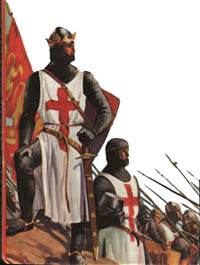 The Crusaders wore the red cross of St George, popularised by the Knights Templar
The Crusaders wore the red cross of St George, popularised by the Knights TemplarBy the fifth century the cult of
St George reached the Western Roman Empire and in 494, George was canonised as a saint by
Pope Gelasius I. The cult was promoted much in England by
King Alfred the Great.
An apparition of
St George is said to have heartened the Franks at the
Siege of Antioch, 1098, and made a similar appearance the following year at Jerusalem.
Chivalric military orders of St George were established in Aragon (1201), Genoa, Hungary, and by
Frederick III, Holy Roman Emperor.
The Byzantine emperors had a great devotion to St George and the
Palaeologue emperors created an order to restore the
Labarum Guard of the
Emperor Constantine, being the 50 knights who guarded the Labarum, a standard emblazoned with the
Chi-Rho symbol that he
Emperor Constantine had seen in the sky before his victory on the
Milvian Bridge.
They dedicated this
Order to St George giving it the symbol of the Cross and the Chi-Rho surrounded by the initials IHSV standing for "
In Hoc Signo Vinces" - "In this Sign shalt thou conquer". The Order was bequeathed to the
Farnese family by the Palaeologues in exile who became its Grand Master.
Here is the Gold Star of the Order with the Chi-Rho and the
IHSV -
In Hoc Signo Vinces.
 The Star of a Knight of Justice of the Constantinian Order of St George
The Star of a Knight of Justice of the Constantinian Order of St GeorgeToday the Order's
Grand Master is
HRH the Infante Don Carlos of Spain.
King Edward III put his
Order of the Garter under the banner of St. George. In England the Synod of Oxford, 1222 declared
St George's Day a great feast day in the Kingdom of England and, famously, his name was invoked by English kings in battle, not least
King Henry V at
Agincourt.
His feast was raised to a
Festum duplex at a church council in 1415, on the date that had become associated with his martyrdom,
23 April.
William Shakespeare was born and died on
23 April,
St George's Day.
 William Shakespeare was born on St George’s Day
William Shakespeare was born on St George’s DayThe
Order of the Garter is still given in the name of “
God, our Lady and St George” and features an image of
St George slaying the Dragon. The hip decoration, at the bottom of the sash, is still called “
the lesser George”.
The original
Garter Star was always diamond-encrusted until, after the illegal seizure of the throne by the Protestant German Hanoverians, the diamonds were only retained for the Sovereign and consort.
The Garter blue of the sash was also darkened so as to distinguish it from the ancient, lighter, colour which was associated with the Stuarts.

The diamond-encrusted Garter Star was, under the Stuarts, given to all Garter knights, but now, since the advent of the Protestant Hanoverian Whigs, to the Sovereign and consort only, other knights receiving but cut metal Garter stars
The Garter Star features, to this day, in a great many military symbols e.g. the rank stars of officers in the
Household Cavalry and the
Household Division and in the
Honourable Artillery Company.
St George features in a great many other military symbols and traditions of the British armed forces and in British society generally.
St George’s Day is, indeed, a great day to be celebrated in the Kingdom of England and for Great Britain.
 The Queen in the Garter procession as Sovereign of the Order. The Garter is still conferred in the name of "God, our Lady and St George".
The Queen in the Garter procession as Sovereign of the Order. The Garter is still conferred in the name of "God, our Lady and St George". ~~ " ~~
“Once more unto the breach, dear friends, once more;
Or close the wall up with our English dead.
In peace there's nothing so becomes a man
As modest stillness and humility:
But when the blast of war blows in our ears,
Then imitate the action of the tiger;
Stiffen the sinews, summon up the blood,
Disguise fair nature with hard-favour'd rage;
Then lend the eye a terrible aspect;
Let pry through the portage of the head
Like the brass cannon; let the brow o'erwhelm it
As fearfully as doth a galled rock
O'erhang and jutty his confounded base,
Swill'd with the wild and wasteful ocean.
Now set the teeth and stretch the nostril wide,
Hold hard the breath and bend up every spirit
To his full height. On, on, you noblest English.
Whose blood is set from fathers of war-proof!
Fathers that, like so many Alexanders,
Have in these parts from morn till even fought
And sheathed their swords for lack of argument:
Dishonour not your mothers; now attest
That those whom you call'd fathers did beget you.
Be copy now to men of grosser blood,
And teach them how to war. And you, good yeoman,
Whose limbs were made in England, show us here
The mettle of your pasture; let us swear
That you are worth your breeding; which I doubt not;
For there is none of you so mean and base,
That hath not noble lustre in your eyes.
I see you stand like greyhounds in the slips,
Straining upon the start. The game's afoot:
Follow your spirit, and upon this charge
Cry:
'God for Harry, England, and Saint George!'
...
 Omnes honorate; fraternitatem diligite; Deum timete; regem honorificate.
Omnes honorate; fraternitatem diligite; Deum timete; regem honorificate.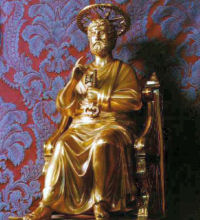



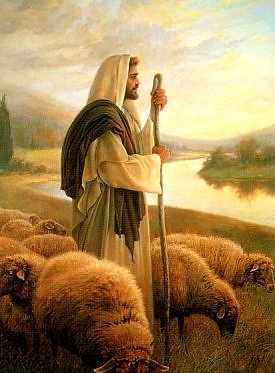











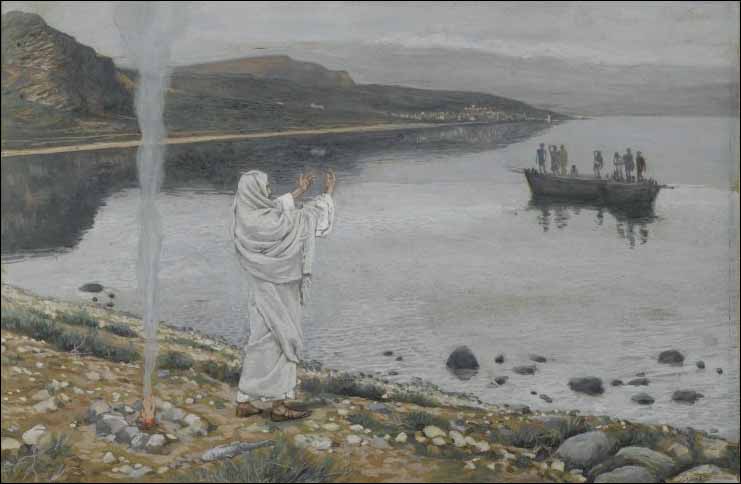


















.jpg)


























_-002.jpg/220px-Circle_of_Anton_Raphael_Mengs,_Henry_Benedict_Maria_Clement_Stuart,_Cardinal_York_(ca_1750)_-002.jpg)


